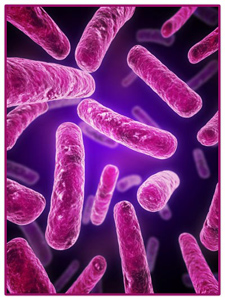February 1, 2010
Priming The Immune System: The Role Of “Good” Bacteria

By Michael D. Shaw
Many of us know—based on earlier unpleasant experiences—that if we are on a course of broad-spectrum antibiotics, we are well advised to have some yogurt, or take probiotic pills. Otherwise, we might be subject to digestive upsets caused by the killing of too many of our good bacteria. A worse scenario can happen in patients who must take antibiotics for a long period of time. Serious secondary bacterial infections can occur, despite the presence of the antibacterial drug.
Research published January 17th in Nature Medicine, from the University of Pennsylvania School of Medicine, suggests that good bacteria in the gut keep the immune system primed. Senior author Jeffrey N. Weiser, M.D. draws the analogy to how a cold engine versus one that is warmed up and idling would perform. He posits that if the immune system is already warmed up, it can better cope with pathogenic invaders. Weiser’s research interest is the molecular basis of infectious diseases.
Long-term antibiotic use, he notes, may effectively throttle down the immune system—specifically the action of neutrophil white blood cells. “Neutrophils are being primed by innate bacterial signals, so they are ready to go if a microbe invades the body,” Weiser explains. “They are sort of ‘idling’, and the baseline system is already turned on.”
Neutrophils are the most common type of white blood cell, comprising about 50-70% of all white blood cells. They are phagocytic, meaning that they can ingest other cells, though they do not survive the act. Neutrophils are among the first immune cells to arrive at a site of infection.
Weiser’s team looked at a particular protein within the neutrophils, Nod1—a receptor that recognizes the polymer peptidoglycan in the cell wall of bacteria. A strain of mice that lacks Nod1 was found to be less effective at killing the pathogenic bacteria Streptococcus pneumoniae and Staphylococcus aureus.
Two other groups of mice were also challenged with the bugs: One that was raised in a germ-free environment, and another that was treated with antibiotics. Both of these groups exhibited decreased immune response, but immune function could be restored if the mice were put back into a conventional environment containing normal bacteria.
The researchers were able to elucidate a mechanism behind these observations. They showed movement of peptidoglycan from the gut to neutrophils in the bone marrow, and found that blood concentrations of peptidoglycan correlate with neutrophil function.
Weiser reminds us that “One of the complications of antibiotic therapy is secondary infection. This is a huge problem in hospitals, but there hasn’t been a mechanistic understanding of how that occurs. We suggest that if the immune system is on idle, and you treat someone with broad-spectrum antibiotics, then you turn the system off. The system is deprimed and will be less efficient at responding quickly to new infections.”
The researchers also determined that immune function could be improved in both antibiotic-treated mice as well as in human neutrophils, if they are treated with Nod1. This finding suggests that it might be possible to counter some of the adverse consequences that antibiotics can cause in humans.
It remains to be seen if such priming will be useful to counteract two other serious problems in health care: Immunocompromised patients and antibiotic resistant bacteria.

